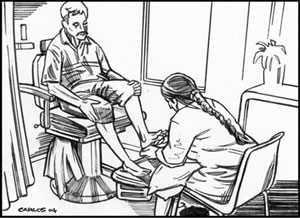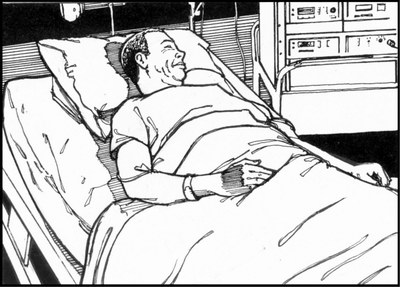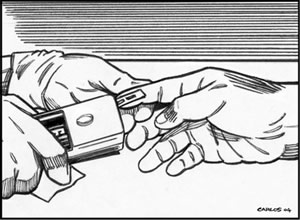Visiting the Doctor
Doctors and other Diabetes Specialists
Diabetes can be serious. It can cause damage.
But if you look after yourself you can prevent damage to your body.
There are lots of people who can help you.
Your Doctor may:
 Ask you lots of questions about - how you are feeling, any current infections, and what healthy foods and exercise you are doing
Ask you lots of questions about - how you are feeling, any current infections, and what healthy foods and exercise you are doing
 Weigh you
Weigh you
Take your blood pressure
 Ask you for a blood with a needle and maybe a urine test
Ask you for a blood with a needle and maybe a urine test
If you don't look after your diabetes you may have problems with your heart, kidneys or nervous system.
A Blood Test from a Nurse:
A blood test is when blood is taken out of your arm.
- You go to the desk to tell them you have come
- You might have to sit and wait
- You will walk into the collection room and be asked to sit in a collection chair
- The nurse will ask your name and when your birthday is and will tell you what will happen
- You will put your arm on the side of the chair with your hand facing up
- A cord is put around the top of your arm
- Your arm will be cleaned with a cotton ball. This is cold and wet
- A needle is put into your arm. It might hurt
- Blood will go into the tube
- The cord will be taken off your arm
- The needle is taken out. It might hurt
- A cotton ball is put on your arm with sticky tape
A bruise can develop where the needle was, but this goes away.
It might also be sore.
Your Podiatrist:

Will examine your feet for any possible problems such as infected cuts or sores.
The Podiatrist will also check that your toe nails are cut correctly.
If you don't look after your diabetes you may have problems walking.
A serious complication could be amputation. That is the removal of toes or a foot or leg.
Your Eye Specialist:

May check your eyes by putting drops in your eyes. They might look at your eyes with a special piece of equipment.
If you don't look after your diabetes you may have problems with your sight.
A serious complication could be blindness.
Your Dietitian:

May talk to you about healthy eating. They may show you how you can eat the foods you like and stay well.
The Dietitian may also weigh you and measure your height and waist.
Your Diabetes Educator:
Your Diabetes Educator may talk to you about how you are coping with your diabetes, your medications, your exercise and your treatment.
They can show you how to use your equipment and monitor your blood glucose levels.

